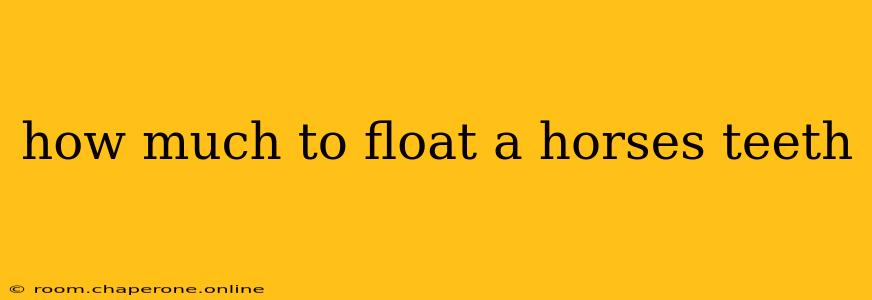How Much Does Floating a Horse's Teeth Cost? A Comprehensive Guide
Floating a horse's teeth is a routine procedure that ensures their dental health and overall well-being. The cost, however, can vary significantly depending on several factors. This guide breaks down the price range and explains what influences the final bill.
Understanding Equine Dentistry and the Floating Process
Before diving into costs, let's clarify what "floating" entails. Equine dentistry involves the careful filing and smoothing of a horse's teeth to correct sharp points, hooks, and other irregularities that can develop over time. These irregularities can cause pain, interfere with eating, and lead to various health problems. The process, often referred to as "floating," is performed by a qualified equine veterinarian or experienced equine dentist. They use specialized tools to gently file down these problem areas, ensuring proper dental alignment and function.
Factors Affecting the Cost of Floating a Horse's Teeth
Several factors influence the final price you'll pay for your horse's dental care:
-
Location: Geographic location plays a significant role. Veterinary and dental services are priced differently depending on the area. Rural areas might have lower costs, whereas urban or suburban locations often command higher fees.
-
Experience of the Professional: A highly experienced and specialized equine dentist will likely charge more than a general practitioner veterinarian who also performs dental work. Their expertise and advanced techniques can justify higher costs.
-
Complexity of the Procedure: Simple floating for a horse with minimal dental issues will be less expensive than a complex procedure requiring extensive work to correct severe problems like wolf teeth removal, extractions, or advanced dental corrections. The time and skill involved directly impact the price.
-
Type of Anesthesia: Some horses require sedation or general anesthesia for dental procedures, especially if they are anxious or have severe dental problems. This significantly increases the overall cost, covering both the anesthesia and the associated monitoring required during the procedure.
-
Additional Services: The cost might increase if additional services are required, such as radiographs (X-rays) to diagnose underlying dental issues or treatment for existing infections or abscesses.
Cost Range Estimates: A Realistic Look
It's difficult to give an exact price without knowing the specific circumstances. However, you can expect the cost of floating a horse's teeth to range from:
-
Basic Floating: $100 - $300 (This typically covers a routine procedure for a horse with minimal dental issues.)
-
Moderate Procedure: $300 - $600 (This includes more extensive work, potentially addressing more significant irregularities.)
-
Complex Cases: $600+ (This covers extensive procedures, including those needing sedation/anesthesia, radiographs, extractions, or other advanced dental work.)
Finding an Equine Dentist or Veterinarian: Important Considerations
Choosing the right professional is crucial. Always prioritize experience and qualifications:
- Seek Recommendations: Ask other horse owners, your veterinarian, or local riding stables for recommendations.
- Verify Credentials: Ensure the professional is certified or has extensive experience in equine dentistry.
- Get a Detailed Estimate: Request a detailed written estimate outlining the specific procedures and associated costs before the appointment.
Maintaining Your Horse's Dental Health: Proactive Care
Regular dental care is crucial for your horse's long-term health. Annual or semi-annual check-ups and floating are recommended to prevent major dental problems and associated costs. Proactive care is significantly cheaper than dealing with more severe issues later on.
By understanding the factors influencing the cost and planning ahead, you can ensure your horse receives the best dental care at a price that fits your budget. Remember to always prioritize the health and well-being of your equine companion.

